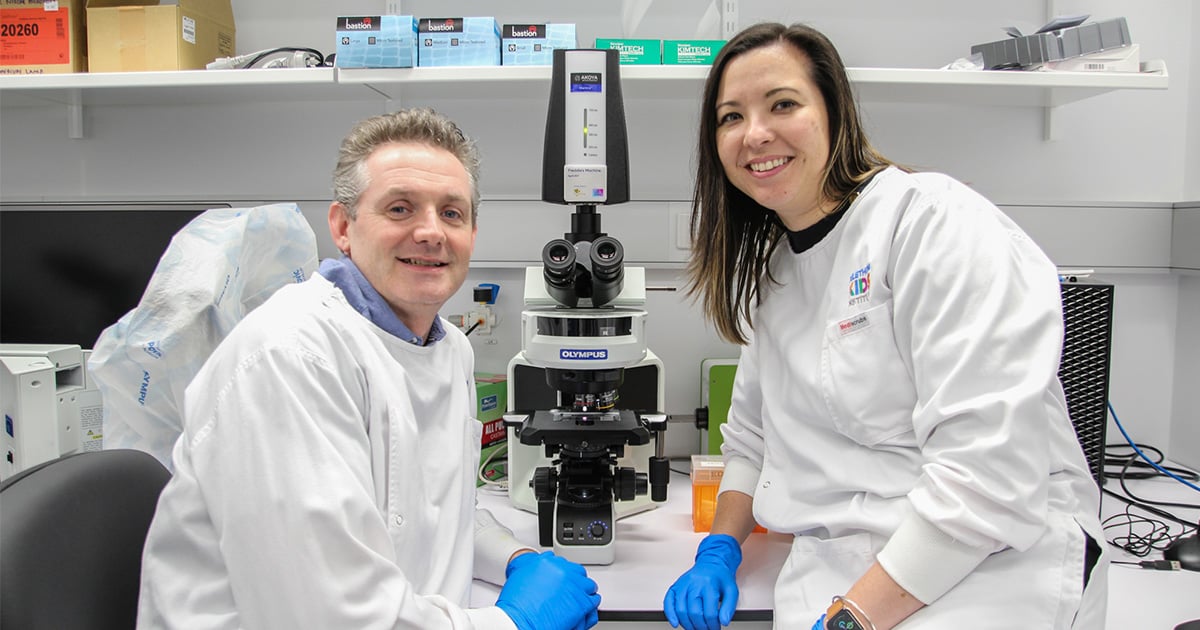Search
Showing results for "A"
Research
Developing clinical predictors of disease progression in children with neuromuscular disorders to prevent future respiratory failureGraham Hall BAppSci PhD CRFS FANZSRS FThorSoc FERS Honorary Research Associate Honorary Research Associate Professor Graham Hall is an

News & Events
Finding new treatments for rare brain cancers in infantsThe WA Kids Cancer Centre has secured $1.1 million in funding from the Medical Research Future Fund’s (MRFF) Paediatric Brain Cancer Research Stream 2 to develop more effective and less toxic treatments for rare brain cancers in infants.
Research
Implementing and Evaluating Interventions to Improve School Readiness and Early LiteracyThe implementation of the Pacific early age readiness and learning program has generated significant data, evidence, operational experience, and knowledge
Research
Vitamin D C3-epimer levels are proportionally higher with oral vitamin D supplementation compared to ultraviolet irradiation of skin in mice but not humansThe proportion of 25(OH)D3 that undergoes epimerization is greater with oral vitamin D3 supplementation than exposure to UVR in mice, but not in humans
Research
Does the Risk Outweigh the Benefits? Adolescent Responses to Completing Health SurveysSelf-reported experiences of adolescents in population-based samples when completing health-related surveys on topics with varying potential for evoking distres
Research
Teacher–Child Relationship, Parenting, and Growth in Likelihood and Severity of Physical Aggression in the Early School YearsThis study investigated the likelihood of children showing problems with parent-rated physical aggression, and on the severity of problems, for 374 children.
Research
In utero exposure to low dose arsenic via drinking water impairs early life lung mechanics in miceAll alterations to lung mechanics following in utero arsenic exposure were recovered by adulthood.
Research
Socioeconomic, Demographic, and Environmental Factors May Inform Malaria Intervention Prioritization in Urban NigeriaUrban population growth in Nigeria may exceed the availability of affordable housing and basic services, resulting in living conditions conducive to vector breeding and heterogeneous malaria transmission. Understanding the link between community-level factors and urban malaria transmission informs targeted interventions.
Research
Expression of CYP24A1 and other multiple sclerosis risk genes in peripheral blood indicates response to vitamin D in homeostatic and inflammatory conditionsAlthough genetic and epidemiological evidence indicates vitamin D insufficiency contributes to multiple sclerosis (MS), and serum levels of vitamin D increase on treatment with cholecalciferol, recent metanalyses indicate that this vitamin D form does not ameliorate disease. Genetic variation in genes regulating vitamin D, and regulated by vitamin D, affect MS risk.
Research
High-Fiber Diet during Pregnancy Characterized by More Fruit and Vegetable ConsumptionHigh-Fiber Diet during Pregnancy Characterized by More Fruit and Vegetable ConsumptionHigher dietary fiber intakes during pregnancy may have the potential health benefits of increasing gut microbiome diversity, lowering the risk of glucose intolerance and pre-eclampsia, achieving appropriate gestational weight gain, and preventing constipation. In this observational cohort study, we have assessed the dietary fiber intakes of 804 women in late pregnancy, using a semi-quantitative food frequency questionnaire (SQ-FFQ). Overall, the median (interquartile range) dietary fiber intake was 24.1 (19.0-29.7) grams per day (g/day). Only 237/804 (29.5%) women met the recommended Adequate Intake (AI) of dietary fiber during pregnancy of 28 g/day.
